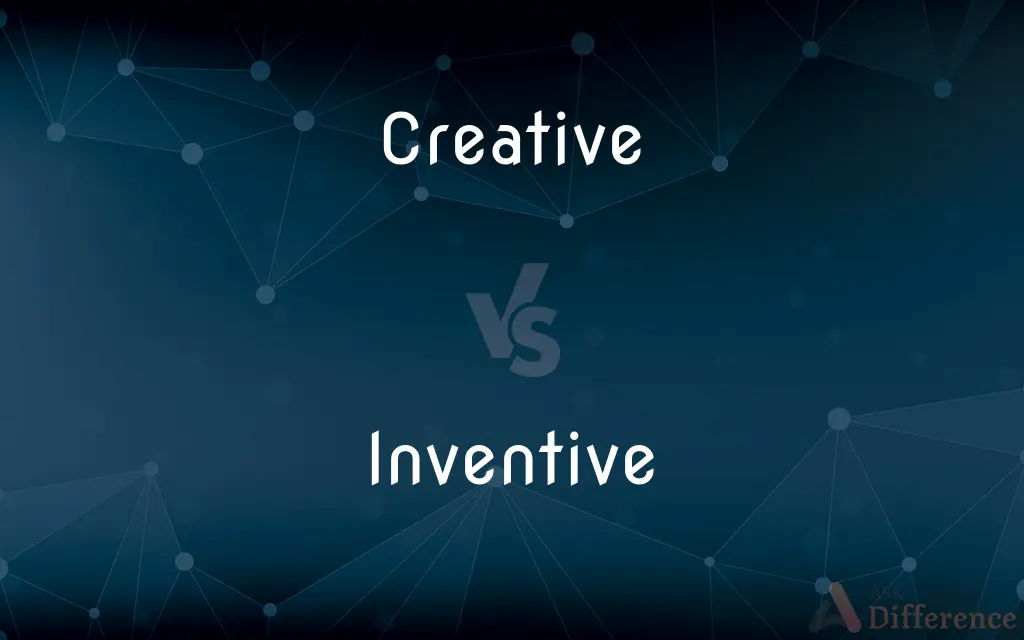Creative vs. Inventive — What's the Difference?
By Tayyaba Rehman & Fiza Rafique — Updated on April 25, 2024
Creative involves the ability to produce original and expressive ideas, while inventive specifically focuses on creating novel solutions or products.

Difference Between Creative and Inventive
Table of Contents
ADVERTISEMENT
Key Differences
Creative thinking often involves imaginative processes that result in artistic or novel ideas, while inventive thinking is geared towards problem-solving and the development of new inventions.
Creativity is generally broad, applying to any field like art, literature, or music, suggesting expressive and original thinking. On the other hand, inventiveness is typically associated with technical or scientific arenas, emphasizing practical and functional innovation.
People who are creative are adept at generating ideas that may not necessarily have practical applications; whereas inventive individuals often create solutions that have specific, tangible applications and benefits.
A creative approach might not lead to a physical outcome but rather to new ways of seeing or understanding, while an inventive approach usually results in the creation of new products or technologies.
Creative skills enhance a person's ability to conceive something unique or original, while inventive skills are crucial in transforming those unique ideas into practical solutions.
ADVERTISEMENT
Comparison Chart
Focus
Original and expressive ideas
Novel solutions or products
Application
Broad (art, literature, music)
Specific (technology, engineering)
Outcome
May not be tangible
Typically tangible
Primary Skill
Idea generation
Problem-solving and application
Associated Fields
Arts, humanities
Sciences, engineering
Compare with Definitions
Creative
Having the ability to create, characterized by originality and expressiveness.
Her creative approach to storytelling captivates her audience.
Inventive
Having the ability to invent. skilled in devising new methods.
His inventive skills were crucial in the new product's development.
Creative
Showing an ability to think in novel ways.
Her creative solutions often save the day at work.
Inventive
Showing creativity in designing or creating new things.
She is known for her inventive use of recycled materials in her sculptures.
Creative
Involving the imagination or original ideas.
He uses creative techniques to enhance his paintings.
Inventive
Resourceful, especially in difficult situations.
He proved to be inventive when faced with a limited budget.
Creative
Pertaining to or involving the creation of something.
The creative process of writing a book is intensely personal.
Inventive
Marked by innovation and originality.
The engineer's inventive approach helped solve the critical issue.
Creative
Capable of looking at things from a new perspective.
A creative mind can offer fresh perspectives on old problems.
Inventive
Capable of coming up with new ideas or concepts that lead to creation.
Inventive thinking is key to tech startups.
Creative
Relating to or involving the use of the imagination or original ideas to create something
Change unleashes people's creative energy
Creative writing
Inventive
Of, relating to, or characterized by invention.
Creative
A person whose job involves creative work
The most important people in the mix will be creatives and direct marketing specialists
Inventive
Adept or skillful at inventing; creative.
Creative
Having the ability or power to create
Human beings are creative animals.
Inventive
Of, or relating to invention; pertaining to the act of devising new mechanisms or processes.
An inventive pursuit
Creative
Productive; creating.
Inventive
Possessed of a particular capacity for the design of new mechanisms or processes, creative or skilful at inventing.
An inventive fellow
Creative
Characterized by originality and expressiveness; imaginative
Creative writing.
Inventive
Purposefully fictive
An inventive story
Creative
One who displays productive originality
The creatives in the advertising department.
Inventive
Able and apt to invent; quick at contrivance; ready at expedients; as, an inventive head or genius.
Creative
Tending to create things, or having the ability to create; often, excellently, in a novel fashion, or any or all of these.
A creative dramatist who avoids cliche
Inventive
(used of persons or artifacts) marked by independence and creativity in thought or action;
An imaginative use of material
The invention of the knitting frame by another ingenious English clergyman
An ingenious device
Had an inventive turn of mind
Inventive ceramics
Creative
(of a created thing) Original, expressive and imaginative.
A creative new solution to an old problem
Creative
(set theory) A type of set of natural numbers, related to mathematical logic.
A creative set
Creative
Designed or executed to deceive or mislead.
Creative accounting
Creative
(countable) A person directly involved in a creative marketing process.
He is a visionary creative.
Creative
(uncountable) Artistic material used in advertising, e.g. photographs, drawings, or video.
The design team has completed the creative for next month's multi-part ad campaign.
I've included in my portfolio all the creative I've completed in my five year design career.
Creative
Having the power to create; exerting the act of creation.
The creative force exists in the germ.
Creative
Having the ability or power to create;
A creative imagination
Creative
Promoting construction or creation;
Creative work
Creative
Having the power to bring into being
Common Curiosities
Can creativity be taught?
Yes, creativity can be fostered through education and practice that encourage divergent thinking, exploration, and experimentation.
Which industries value creativity the most?
Industries that value creativity highly include advertising, arts and entertainment, design, and media.
How do cultural perceptions of creativity and inventiveness differ?
Cultural perceptions can vary significantly; some cultures might emphasize creativity as a form of personal expression while others might value inventiveness for its contribution to societal and technological progress.
Which industries value inventiveness the most?
Industries that highly value inventiveness include engineering, technology, pharmaceuticals, and manufacturing.
What role does creativity play in education?
In education, creativity encourages students to explore new ideas, enhances problem-solving skills, and promotes a deeper understanding through innovative thinking and learning techniques.
How does one measure creativity?
Measuring creativity can be challenging, but it often involves assessments that gauge divergent thinking, the ability to generate multiple ideas, and originality tests.
What skills are important for being creative?
Important skills for being creative include imagination, open-mindedness, problem-solving, and the ability to see connections between seemingly unrelated phenomena.
Can inventiveness be taught?
Yes, inventiveness can be taught through educational programs that emphasize STEM learning, critical thinking, and hands-on problem-solving experiences.
What skills are important for being inventive?
Crucial skills for being inventive include technical knowledge, analytical thinking, practical problem-solving, and the ability to apply ideas in real-world scenarios.
How do organizations foster a culture of inventiveness?
Organizations foster a culture of inventiveness by investing in research and development, encouraging employee innovation, and supporting a process for turning ideas into viable products or services.
What role does inventiveness play in economic growth?
Inventiveness drives economic growth by fostering new industries, improving efficiency, and creating new products and services that meet evolving market demands.
How does one measure inventiveness?
Inventiveness can be measured through metrics like patents filed, innovations developed, or the practical impact of solutions on specific problems.
Can creativity lead to inventiveness?
Yes, creativity can lead to inventiveness when creative ideas are applied to solve practical problems or meet specific needs in innovative ways.
How do organizations foster a culture of creativity?
Organizations can foster a culture of creativity by providing a supportive environment that encourages risk-taking, values diverse perspectives, and offers resources for creative endeavors.
What is the societal impact of high levels of creativity and inventiveness?
High levels of creativity and inventiveness can lead to significant societal impacts, including advancements in arts and culture, technological breakthroughs, and solutions to complex global challenges.
Share Your Discovery

Previous Comparison
Fail vs. Flunk
Next Comparison
Locality vs. VillageAuthor Spotlight
Written by
Tayyaba RehmanTayyaba Rehman is a distinguished writer, currently serving as a primary contributor to askdifference.com. As a researcher in semantics and etymology, Tayyaba's passion for the complexity of languages and their distinctions has found a perfect home on the platform. Tayyaba delves into the intricacies of language, distinguishing between commonly confused words and phrases, thereby providing clarity for readers worldwide.
Co-written by
Fiza RafiqueFiza Rafique is a skilled content writer at AskDifference.com, where she meticulously refines and enhances written pieces. Drawing from her vast editorial expertise, Fiza ensures clarity, accuracy, and precision in every article. Passionate about language, she continually seeks to elevate the quality of content for readers worldwide.














































